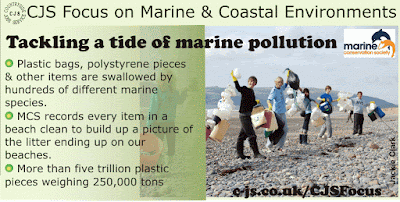Plastic bag free?
Did you manage a month plastic free?
If not how about trying one full day without using any plastic bags?
Tomorrow is Plastic Bag Free Day
"Its ok, I use reusable bags not single use carriers",
The EU produces 3.4 million tons of plastic carrier bags every year, that's equivalent to 500 for each person in the European Union and most are only used for 25 minutes!
Not only is all that plastic coming from a finite resource (crude oil) but over 80% of marine litter is plastic. And the impact of that doesn't even bear thinking about....
Did you know that turtles mistake floating bags for jellyfish and gobble them up filling their stomachs with indigestible plastics? Or that British seabirds take in broken up pieces mistaking them for fish.
The oceans are big, huge, even incomprehensible in scope so how do we get rid of all the plastic, decrease the 'floating garbage patches' - the biggest is in the Pacific ocean and estimates of its size from 1/4 million square miles to over five million. (read more on wikipedia here)
Dutchman Boyan Slat dreamt up a possible solution three years ago when he was just 17, now the first trials and feasibility studies are coming through and his idea seems to work! Find out more about his solution and his company, the Ocean Cleanup here: www.theoceancleanup.com
He emphasizes: “Although a cleanup will have a profound effect, it is just part of the solution. We also need to close the tap, to prevent any more plastic from reaching the oceans in the first place.”
It's not just bags of course, it's everything plastic, bottles, wrappers, plastic lighters, plastic light fittings, electronic equipment, microscopic beads in cosmetics but how do we know which is worst, most prevalent?
MCS are looking at just that, by comparing data from the regular beach cleans they can see what's washing ashore.
Find out more about the problem plastic present and what you can do to help by reading their lead article in our most recent CJS Focus.
If not how about trying one full day without using any plastic bags?
Tomorrow is Plastic Bag Free Day
"Its ok, I use reusable bags not single use carriers",
- but what about the little bags you put your veggies in at the supermarket?
- the one your lunchtime pastry comes in?
- the bag you froze last week's leftovers that you're having for tea tonight?
- the one that's in the bin to stop the use tea bags leaking all over the floor?
The EU produces 3.4 million tons of plastic carrier bags every year, that's equivalent to 500 for each person in the European Union and most are only used for 25 minutes!
Not only is all that plastic coming from a finite resource (crude oil) but over 80% of marine litter is plastic. And the impact of that doesn't even bear thinking about....
Did you know that turtles mistake floating bags for jellyfish and gobble them up filling their stomachs with indigestible plastics? Or that British seabirds take in broken up pieces mistaking them for fish.
The oceans are big, huge, even incomprehensible in scope so how do we get rid of all the plastic, decrease the 'floating garbage patches' - the biggest is in the Pacific ocean and estimates of its size from 1/4 million square miles to over five million. (read more on wikipedia here)
Dutchman Boyan Slat dreamt up a possible solution three years ago when he was just 17, now the first trials and feasibility studies are coming through and his idea seems to work! Find out more about his solution and his company, the Ocean Cleanup here: www.theoceancleanup.com
He emphasizes: “Although a cleanup will have a profound effect, it is just part of the solution. We also need to close the tap, to prevent any more plastic from reaching the oceans in the first place.”
It's not just bags of course, it's everything plastic, bottles, wrappers, plastic lighters, plastic light fittings, electronic equipment, microscopic beads in cosmetics but how do we know which is worst, most prevalent?
MCS are looking at just that, by comparing data from the regular beach cleans they can see what's washing ashore.
Find out more about the problem plastic present and what you can do to help by reading their lead article in our most recent CJS Focus.
